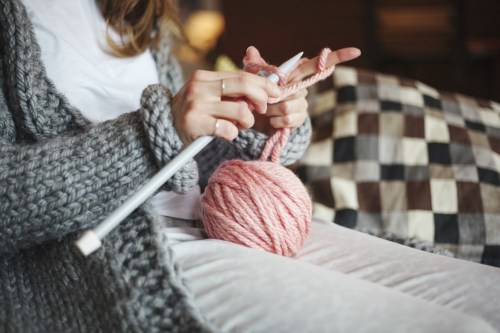Our editors independently select these products. Making a purchase through our links may earn Well+Good a commission
Here’s a Quick Test To Measure Your Creativity—Plus, 4 Easy Ways to Boost It
Creativity is about so much more than your ability to paint a picture or crochet a top. Take this creativity test to measure yours.

Creativity is about so much more than your ability to paint a picture or crochet a top. Everything from managing your calendar to organizing your closet requires creativity, explains Jay Olson, PhD, a postdoctoral fellow in the phycology department at Harvard University. “Creativity is important because it’s at the core of some fundamental aspects of human life, from art to technological development,” he says. Dr. Olson, along with a team of researchers, created this four-minute test that allows you to measure your creativity based on your ability to think of unrelated thoughts during a limited time frame.
Experts in This Article
Allison Holzer is the co-founder of the inspiration strategy company InspireCorps.
Anna Rose Johnson is senior manager of platform marketing at Cricut, a brand that makes super-techy cutting machines.
clinical psychologist, life fulfillment expert, and author of Date Smart, Joy From Fear, and Aging Joyfully
behavioral scientist and postdoctoral fellow in the psychology department at the University of Toronto
“The test focuses on divergent thinking, the ability to generate a diverse range of responses such as when brainstorming,” says Dr. Olson. “You name 10 unrelated words, an algorithm then measures the semantic distance between the words. Those that are more related, like ‘cat’ and ‘dog,’ have shorter distances than those that are less related, like ‘cat’ and ‘book.’ The average of these distances gives you a score, usually between 50 and 100, signifying the extent of divergent thinking during the task.”
Dr. Olson was inspired to make the test based on a game he played as a kid. “My friends and I used to call out words that had no relationship with each other,” he says. “It was surprisingly difficult, at least for us kids. After several words, we would inevitably choose another word that was quite related to one of the previous ones.”
Recently, Dr. Olson piloted the test, and had participants in a study perform it, plus a few other well-established creativity tests. The results of who was the most creative were the same; however, Dr. Olson says that the task only measures a sliver of creativity.
“It is hard to conclude anything from taking any single task—especially one that only takes a few minutes,” he says. “In research, we usually measure creativity in a more multi-faceted way that involves both task-based approaches and an assessment of real-world creative achievement.”
The creativity test scores out of 100, and most people score between 74 and 82. During the study, the highest score was 92 and the lowest was 20. You have up to four minutes to complete the test. Luckily, if you’re not satisfied with your results, there are ways to boost your creativity.
4 tips for boosting your creativity
1. Try new things
If you’re looking to get more creative, clinical psychologist Carla Marie Manly, PhD, says to be open minded and experiment when the urge strikes.”When creative energy begins to flow, take advantage of it,” she previously told Well+Good. “Whether you feel led to write, draw, or engage in other self-inspired adventures, let your creative energy guide you into new realms.”
2. Schedule time to be bored
It can also help to allow yourself unstructured time to just do nothing, co-founder of inspiration strategy company InspireCorps Allison Holzerpreviously told Well+Good. “It just gives yourself breathing room and time when you’re not just going from one activity to another,” says Hozer, who co-authored Dare To Inspire ($18). She pencils in an hour and a half every week to do nothing.
3. Don’t overthink it
Figuring out ways to be creative shouldn’t take too much thought. For example, if you’re looking to get into crafting, pick something that you’re already interested in trying. “When you’re scrolling through Instagram, do you stop and look at a funny card? A beautiful mug? Typography? When I’m cruising my Instagram stories, I always find myself stopping on images of very clever cards,” says Anna Rose Johnson, senior manager of platform marketing at Cricut, a brand that makes super-techy cutting machines. “Once you’ve found that craft you enjoy, just like the type of exercise you prefer, start trying different things out. Pretty soon, you’ll know what kinds of things you like to make and what things you’re good at making.”
4. Watch or spend time with people who inspire you
Whether that’s having dinner with a friend whose ability to effortlessly whip up a meal makes you want to get into the kitchen or watching a documentary about a musical you love, soaking in their energy can help you feel more creative. “The idea of inspiration being contagious comes from research on emotional intelligence,” says Hozer. “All emotions are contagious, but we learned that inspiration is really contagious. If you’re with someone inspiring, you start to feel that energy, and it leads to feeling greater possibility in yourself.”
Oh hi! You look like someone who loves free workouts, discounts for cult-fave wellness brands, and exclusive Well+Good content. Sign up for Well+, our online community of wellness insiders, and unlock your rewards instantly.
Sign Up for Our Daily Newsletter
Get all the latest in wellness, trends, food, fitness, beauty, and more delivered right to your inbox.
Got it, you've been added to our email list.










